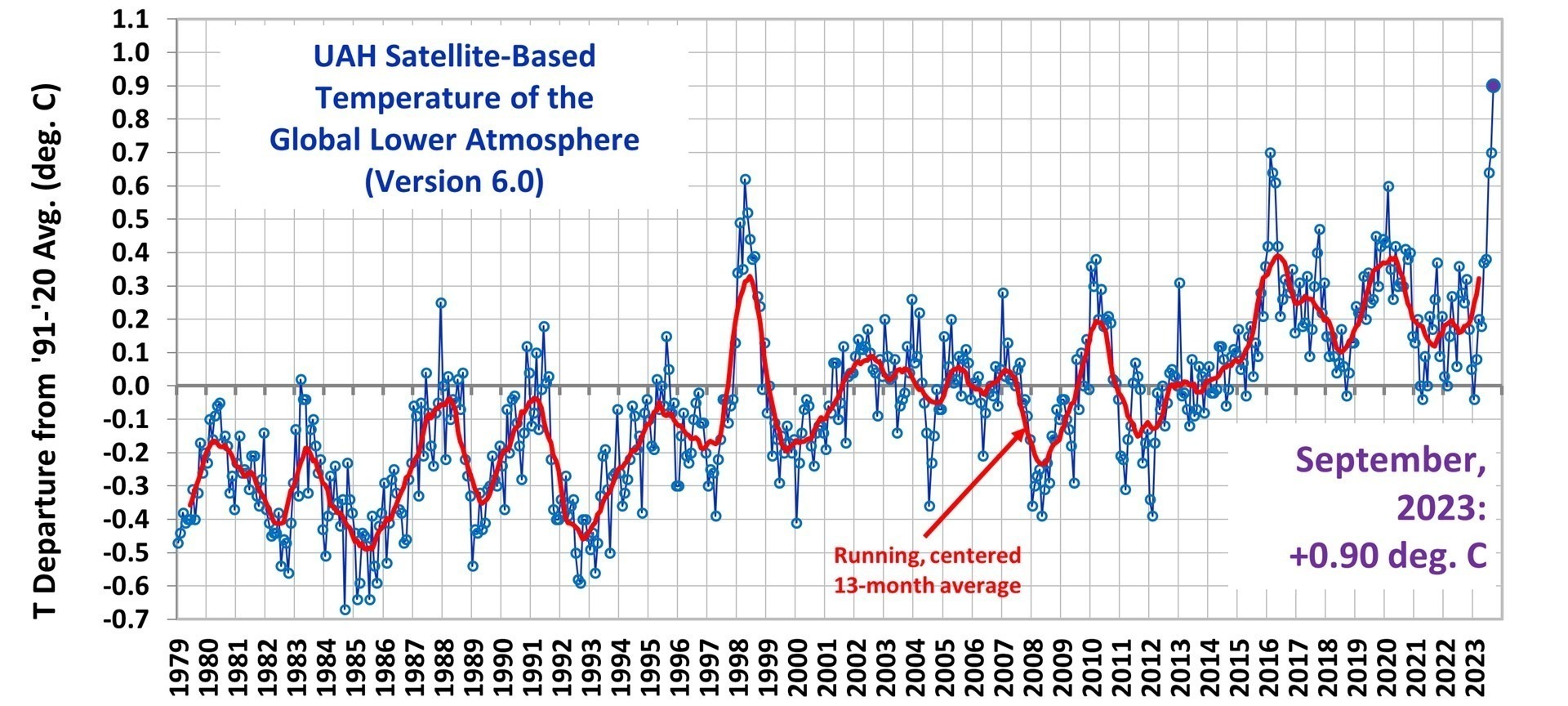https://notalotofpeopleknowthat.wordpress.com/2023/10/06/hottest-evah-september/
By Paul Homewood
h/t Ian Magness
Well, they would, wouldn’t they!
The latest of many heat records broken this year is putting the world on course for its hottest year ever, and is a sign of what is to come in future, according to scientists.
Last month was not only the hottest September on record, new data has confirmed, but it was higher by a margin described by stunned scientists as “extraordinary”, “huge” and “whopping”.
I’ll ignore the ignorance of journalists who think that the world started in the 19thC, during the Little Ice Age. And the fact that a “global average temperature” is a meaningless construct, which assumes you can average completely different things.
According to satellite data, the temperature anomaly last month was 0.24C higher than the previous peak in 2016:

https://www.drroyspencer.com/latest-global-temperatures/
The idea that GHGs can make such a difference in such a short period of time is utterly absurd. But the Sky report does give us a clue:
Piers Forster – the interim chair of the government’s Climate Change Committee but speaking in his capacity as climate change professor at Leeds University – said variations between months each year are usually quite small.
“Therefore, breaking the previous September record by a whopping 0.5C is crazy and shows something really bizarre is going on in the oceans,” he said.
Greenhouse gases have been warming not just the atmosphere but also the deep ocean, especially in the Atlantic, added Prof Forster, and now a change in ocean circulation is “causing some of that heat from the deeper ocean to resurface and bite us”.
Forster is quite wrong, knowingly I suspect, because it is physically impossible for GHGs to warm the deep ocean. This is because infrared radiation can only penetrate the top few millimeters of the sea.
However, oceans are an enormous heat store, and a change in ocean circulation, as implied by Forster, can have large effects on atmospheric temperatures.
After all, swings from La Nina to El Nino can often increase global temperatures by a full degree, and that is just a result of ocean circulation is a small part of the Pacific.
And that heat is supplied by the sun, not carbon dioxide.
Why then is there no scientific research going on into what is happening in the oceans and why? Is it more convenient just to blame climate change?
There has also been absolutely no mention in any of these reports of the underwater Hunga Tonga volcano, which erupted in January last year, blasting an enormous plume of water vapor into Earth’s stratosphere.
Water vapour, as we know, is by far the most powerful GHG, responsible for about half of the Earth’s greenhouse effect. The eruption was so powerful that the plume reached the stratosphere, where it can only very slowly return to the Earth’s surface, unlike water vapour in the troposphere.
For the months after the eruption this greenhouse effect was countered by the cooling effect of the ash and aerosols sent aloft. Now that this effect has receded, we are seeing the full greenhouse effect of the plume.
One study last year found that:
This extra water vapor could influence atmospheric chemistry, boosting certain chemical reactions that could temporarily worsen depletion of the ozone layer. It could also influence surface temperatures. Massive volcanic eruptions like Krakatoa and Mount Pinatubo typically cool Earth’s surface by ejecting gases, dust, and ash that reflect sunlight back into space. In contrast, the Tonga volcano didn’t inject large amounts of aerosols into the stratosphere, and the huge amounts of water vapor from the eruption may have a small, temporary warming effect, since water vapor traps heat. The effect would dissipate when the extra water vapor cycles out of the stratosphere and would not be enough to noticeably exacerbate climate change effects.
They calculated that the radiative forcing from this plume of water vapour was about two thirds of the CO2 growth between 1996 and 2005.
How much of the recent spike in temperatures is due to Hunga Tonga is debatable.
But what I find remarkable about this, if unsurprising, is how there has been virtually no public discussion of this, or serious scientific research into it. Instead climate scientists seem to want to brush it under the carpet, and blame rising temperatures on “climate change”.



